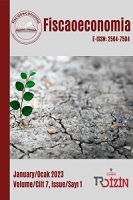Üniversiteler Birbirine Sosyal, Kurumsal ve Bilişsel Olarak Ne Kadar Yakındır? TÜBİTAK Proje İş Birlikleri Üzerinden Bir Analiz
How Close Are Universities Socially, Institutionally and Cognitively? An Analysis Through TUBITAK Project Collaborations
Author(s): Sevim UNUTULMAZ GÜRLEKSubject(s): State/Government and Education, ICT Information and Communications Technologies, Globalization, Socio-Economic Research, Sociology of Education
Published by: Ahmet Arif Eren
Keywords: Scientific Collaboration; Social; Institutional and Cognitive Proximity; Gravity Model; Negative Binominal Regression Analysis;
Summary/Abstract: As a result of the progress of information and communication technologies, the globalization, specialization and interdisciplinary nature of science strengthen the communication ties of scientists and policymakers with the international community. Therefore, scientific cooperation is an inevitable approach in today’s knowledge economy. In this context, the aim of the study is to examine the relationships between scientific collaborations established between universities and social, institutional and cognitive proximity dimensions using the perspective of proximity. In this way, it is aimed to contribute to the literature by analyzing the relationship between proximity and economic networks. The scope of the study consists of accepted and successful 2323 TUBITAK 1001 projects completed by 193 universities between 2012-2020. Analyzes were performed in R and UCINET 6,732 programs. The results are as follows: As the number of projects carried out by universities increases, the tendency to cooperate increases. Institutional proximity indicates that the same type of institutions are more likely to cooperate. Social proximity appears to have a significant and positive effect on scientific cooperation. Finally, it has been determined that the similarities in the scientific fields of the researchers in the projects do not have an effect on scientific cooperation. These results show that the same scientific specializations dont play an important role in promoting inter-university collaborations. This study contributes to planners, policymakers and researchers to strategically allocate resources and shape policies to achieve an effective and interdisciplinary cooperation environment.
Journal: Fiscaoeconomia
- Issue Year: 7/2023
- Issue No: 1
- Page Range: 525-549
- Page Count: 25
- Language: Turkish

